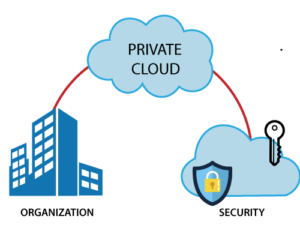What is Private Cloud Storage?

What is Private Cloud Storage?
A private cloud refers to a dedicated cloud computing environment exclusive to a single organization. All underlying compute resources, such as CPU and storage, are provisioned on demand through a self-service portal, and all resources remain under the control of the organization. Also known as an internal or corporate cloud, a private cloud provides a higher level of control and security compared to public or hybrid cloud solutions.
What Are Public Clouds and Hybrid Clouds?
Public Cloud:
Managed by a third-party provider, offering scalability and automation. It is cost-effective and provides a broad range of services to a global user base. The purchase and upkeep of physical data centers and servers are not required.
For instance, a startup might use AWS to host its web applications and databases. By doing so, the startup can take advantage of the scalability and flexibility offered by AWS, only paying for the resources it consumes on a pay-as-you-go basis. The public cloud model allows businesses to access a vast array of services and resources without the burden of managing and maintaining the underlying infrastructure, making it an attractive option for companies of all sizes. Other examples of public cloud providers include Microsoft Azure, Google Cloud Platform, and IBM Cloud.
Hybrid Cloud:
Integrates both public and private clouds, allowing seamless data and application migration between environments for enhanced flexibility and management. In this case, a private physical infrastructure may be utilized with public cloud resources handling tasks that require less security or more computing power.
For example, a company maintains sensitive customer data and critical business applications on a private cloud hosted in its on-premises data center. Simultaneously, the company uses a public cloud service, such as Amazon Web Services (AWS) or Microsoft Azure, to handle additional computing resources for non-sensitive workloads or to accommodate spikes in demand.
A private cloud storage solution might host the customer database and financial applications to ensure strict control and compliance with regulatory requirements. Meanwhile, the public cloud could be utilized to deploy web applications, conduct data analytics, or manage less sensitive information. The hybrid cloud architecture allows the organization to balance the need for security and compliance with the flexibility and scalability offered by the public cloud.
Origin of the Term Private Cloud:
The term “private cloud” or “private cloud storage” originated in the context of the evolution of cloud computing. Before the advent of cloud services like Amazon Web Services (AWS) or Microsoft Azure, organizations traditionally owned, purchased, and maintained their own hardware, including servers, storage devices, and networking equipment. This infrastructure was typically housed in on-premises data centers or co-location facilities to support the organization’s IT operations.
When the concept of cloud computing was introduced, it allowed users to access computing resources on-demand over the internet, some organizations sought to replicate this cloud model within their internal infrastructure. They aimed to provide similar benefits, such as flexibility and resource scaling, but within the confines of their own data centers.
To distinguish between these internally managed cloud environments and third-party public cloud services, the term “private cloud” was introduced. The “private” designation emphasizes the dedicated and isolated nature of the cloud infrastructure, which is exclusively used by a single organization rather than being shared with multiple users or entities.
Benefits of a Private Cloud Storage:
Private clouds offer a range of advantages that cater to specific organizational needs. One key benefit is enhanced security, as private clouds provide a dedicated environment where organizations have greater control over security measures. This is appealing for industries dealing with sensitive data or those subject to stringent regulatory compliance standards. The customization and control afforded by private clouds allow organizations to tailor their infrastructure to unique specifications, including the selection of hardware, software, and network configurations.
In addition to security and customization, private clouds are recognized for their compliance capabilities. Industries such as healthcare, finance, and government, which face rigorous regulatory standards, often find private clouds to be a suitable solution. The predictability of performance in a private cloud, owing to the lack of resource sharing with other users, is crucial for mission-critical workloads. The scalability of private clouds provides flexibility in resource allocation, enabling organizations to efficiently adapt to varying workloads while maintaining optimal performance.
Private Cloud Architecture:
Private cloud architecture shares similarities with public cloud setups and involves technologies such as virtualization, management software, and automation. Virtualization abstracts IT resources from physical hardware, management software ensures centralized control, and automation speeds up tedious tasks, making infrastructure management more efficient.
Private cloud storage comes in various forms:
- On-Premises Private Cloud: Deployed in an internal data center, requiring resource purchase, maintenance, and security management.
- Managed Private Cloud: Fully managed by a third party in an external data center, offering convenience and support.
- Virtual Private Cloud: Deployed within a public cloud infrastructure, combining the convenience of public cloud resources with additional control and security.
MyWorkDrive and Private Cloud Storage:
MyWorkDrive is the leading choice when implementing private cloud storage.
MyWorkDrive outshines competitors like Egnyte and ShareFile. Unlike Egnyte, MyWorkDrive seamlessly integrates into existing Windows File Share infrastructure, OneDrive, or SharePoint, offering a cost-effective alternative with secure remote file access and no need for data migration.
Using MyWorkDrive to implement private cloud storage, with files remaining in place, can be significantly more cost-effective than Egnyte.
MyWorkDrive uniquely enables remote office document editing with native Office 365 online and Office Mobile Apps on local file shares, avoiding the need for cloud syncing before editing as is the case with ShareFile.
Its reduced administration overhead, better Web Browser Client, and robust security measures, including SHA256 Encryption, make MyWorkDrive the preferred choice for organizations seeking a secure, collaborative, and user-friendly private cloud storage experience.
